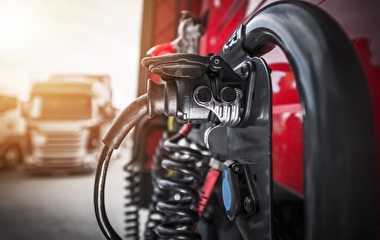
A project that developed technology to improve the fuel efficiency of last-mile delivery vehicles is the recipient of this year’s Robert C. Johns Research Partnership Award.
Large delivery companies such as UPS use analytics to assign routes to minimize fuel consumption. Current UPS routing algorithms use historical data and do not interact directly with vehicles on the road.
The team integrated new technology into UPS electric powertrain vehicles to allow them to make adjustments in real time. The upgrades connect vehicles to the “cloud” to feed route analytics and enable the powertrains to respond to changing conditions such as weather and traffic.
The project led to a 20 percent improvement in the fuel economy of hybrid delivery vehicles operating as part of the UPS fleet, says Will Northrop, associate professor in the Department of Mechanical Engineering and director of the U’s Thomas E. Murphy Engine Laboratory.
The research may also help reduce the energy consumption of future connected and automated delivery vehicles and has the potential to ease the transition to electrification for commercial applications, Northrop says.
The project was funded by the Advanced Research Projects Agency-Energy (ARPA-E) of the US Department of Energy (DOE).
Project partners included UPS and Workhorse Group Inc., an electric medium-duty vehicle manufacturer. “Our industry partners expanded and validated the research results to provide a pathway for later commercialization, increasing the impact of the project,” Northrop says.
Several proposed markets are ripe for implementation including last-mile delivery, Class 8 freight delivery trucks, and transit buses. Discussions have also been initiated with MnDOT and other municipal fleets in Minnesota to advance the research and equip more electric vehicles with assistance from federally sponsored research programs.
The U of M team is seeking new opportunities to extend the research implementation to other partners both through the University and Exergi Predictive, a new startup company co-founded by Northrop.
Under a licensing arrangement with the U of M, Exergi developed and tested technology that can accurately predict the vehicle range and state of charge at the end of a route. The research, which uses predictive algorithms developed and tested in the UPS project, was funded under a DOE Small Business Innovation Research (SBIR) Phase I grant. “Results showed that the route-end state of charge could be predicted to high accuracy very early into a new trip,” Northrop says. The technology will be expanded to more vehicles later in 2021 pending the outcome of Exergi’s DOE SBIR Phase II proposal, he adds.
The Research Partnership Award is named in honor of former CTS director Robert Johns. The award is presented annually to a team of individuals who have collaboratively drawn on their diverse expertise to achieve significant impacts on transportation.
Project Team
- University of Minnesota: Will Northrop; Shashi Shekhar, co-investigator, Department of Computer Science & Engineering; Shawn Haag, research program manager; Pengyue Wang and Yan Li, graduate students
- UPS–Automotive: Michael McDonald, director of maintenance & engineering for sustainability and government affairs
- Workhorse Group Inc.: Mike Muldoon, telematics lead
- JKV Engineering: Jude Hueber, principal engineer


